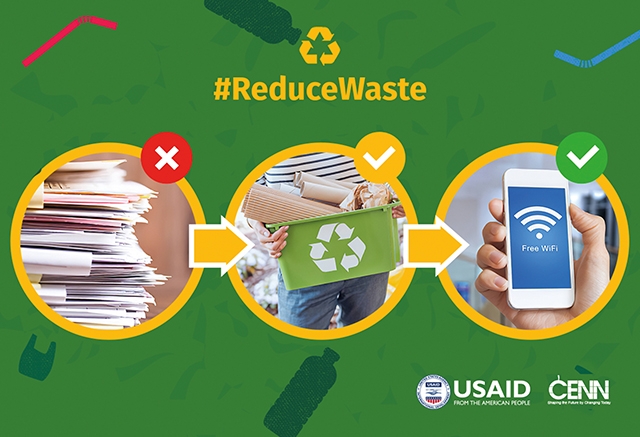How to Organize Events Without Producing So Much Waste? CENN/USAID Recommendations
Arranging eco-friendly events will soon be a priority. Regardless of event size, there are simple steps an organizer can take to drastically reduce the negative impact on the environment.
With sustainability and social responsibility hot topics these days, there is tremendous opportunity to make any high-profile event a platform for increasing public awareness about eco-friendly alternatives available and the importance of recycling.
In order to contribute to decreasing the harmful impact on the environment, CENN/USAID WMTR program has developed a special Low Waste Event Guide that teaches companies and individuals how to reduce waste when organizing various events. The online version of the guide is available on the CENN Environmental Knowledge Portal (http://environment.cenn.org/waste-management/).
The Low Waste Event Guide helps to plan events in a way that prevents as much waste as possible, which can be achieved through careful planning, clear communication with event organizers and attendees, and a bit of creativity. The guide explains the basics of low waste events by focusing on reducing paper, plastic, and food waste, and recycling what is left.
The guide includes several practical and useful tips on how to organize events in a way that will create minimum damage to nature.
Reducing Paper Waste
“E-mail attendees the schedule and any event documents ahead of time,” the guide reads.
Among many detailed tips, the Guide highlights the importance of sending out electronic invitations and advising attendees to keep an e-version of the invitation on the cloud or a smartphone.
Making sure that an invitation is recyclable is also important. CENN advises those who care for the environment to avoid bright-colored, dark-colored, fluorescent or metallic papers, which cannot be recycled. If your event requires tickets, going digital or having a guest list ready is also highly recommended.
Plastic Waste
The second section of the guide focuses on reducing plastic waste. The first important issue in this direction is reducing plastic water/beverage bottles. To solve this, it is recommended to provide a water pitcher/glass dispensers and reusable cups, or offer beverages in recyclable glass bottles and/or aluminum cans when hosting the event.
The event organizers are advised to provide reusable plates and metal utensils instead of single-use plastic items, particularly when it comes to single use condiment packaging, which results in unnecessary waste.
Food Waste
Reducing Food Waste is an important part in terms of environment protection. The guide provides detailed tips on how to achieve this goal.
One of the recommendations by CENN to event organizers is that caterers only prepare enough food for the number of attendees, keeping in mind that many people may not eat a full meal.
It is also important to plan the menu to include only plant-based foods, as a reduction in meat consumption will lead to a reduction in dietary GHG emissions.
Companies and individuals are advised to keep track of the amount of food leftover after the event and, if necessary, order that percentage less for the next event with the same caterer.
Waste Sorting
In order to ensure waste sorting, hosts of the events are suggested to place signage on bins to indicate which items can be put in which bin and note that all items placed in the recycling bin must be clean and dry.
Education and awareness raising plays an important role in terms of environment protection. Therefore, CENN gives recommendations on how to inform attendees of your event about waste recycling.
It is also suggested to include a message that the event is zero waste in the invitations, speeches, presentation openings, social media posts, and press-releases, and also place the message on the materials in order to raise public awareness.
Following the event, organizers can bring the collected recyclable items to one of Tbilisi, Kobuleti, Khelvachauri or Batumi’s waste separation corners (the map of locations can be found in online version of the guide available on CENN website).
“Alternatively, when planning the event, communicate with the local aggregating company Clean World and arrange with them to collect the separated waste,” reads the guide.
Additional recommendations related to arranging eco-friendly event include avoiding decorations designed for one-time use (banners developed for this event, streamers, balloons, etc.); building your theme around recyclable décor; find venues that use alternative energy sources when possible (solar, wind, geothermal, biomass or hydro) and providing LED lights on timers/motion sensors if natural light isn’t possible.
The full version of the Low Waste Event Guide is available on the CENN Environmental Knowledge Portal (www.environment.cenn.org/waste-management/).











